August 9, 2014 - 17:20

--name yourself and 3 words (noun or adj.) that you use to identify yourself:
categories that are important to you, and that you are comfortable using
--count to 4/break into groups of 3, to go up one level of abstraction--
what are the kinds of categories that we use to name ourselves?
--draw site map on board: categories and # of entries inside it
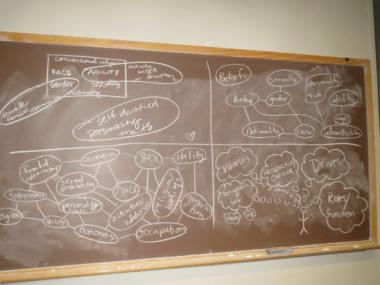
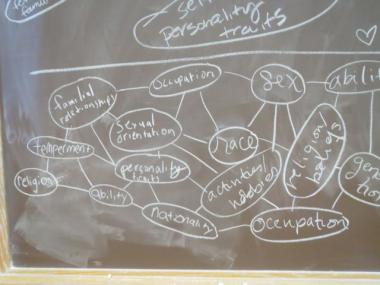
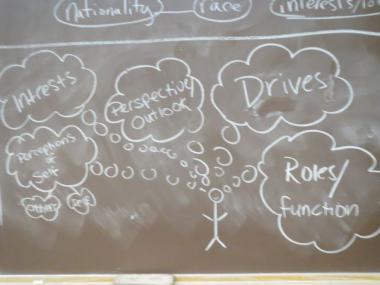
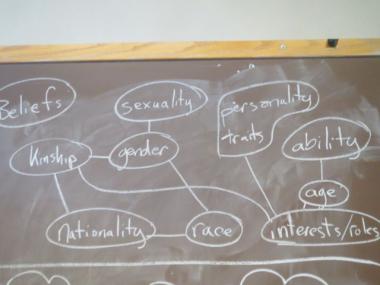
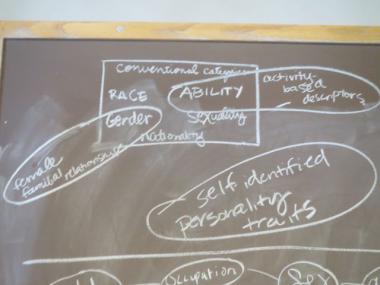
discuss: what categories did we fail to use?
the conventional 6: race (ethniticy)/class/gender/religion/sexual orientation/disability
other categories as-or-more important than these?
--why avoid some of these? (too important? too scary? too obvious?)
what proportion of the categories are visible/invisible?
what proportion of the categories do we occupy willingly/unwillingly?
what proportion are "natural," imposed?
what do the categories male/female, man/woman, gender/sexuality signify?
what categories matter most, when we discuss our identities and those of others?
what do we know (or think we know) about someone, when we know their identity category?
II. why'd we do this?
get you thinking/doing something experiential
remind you that you know quite a bit already, from your life experience,
also! that what you know is infinitely revisable, in exchange w/ others
and that there's been lots of interesting work done in these areas, where we can learn more....
"gender" and "sex"--2 categories most often used to categorize people,
fix them w/ expectations, oppress them for not meeting them
anyone doing work on sex and gender these days thinks of these 2
categories as imbricated in matters of race, class and--
more recently--disability (topic of the two other courses in this cluster)
decided arc of the course is that we are category-making creatures
(given our neural networks/way we are wired, we cannot but make categories)--
BUT also that we can revise categories that may have been useful to our ancestors,
once upon a time, in a different era, different culture...and that our categories are
intersectional (per Eli Clare: ".. .gender reaches into disability; disability wraps around class;
class strains against abuse; abuse snarls into sexuality; sexuality folds on top of race. . .
everything finally piling into a single human body")
we will use a range of different texts to really push the implications of this sort of
questioning of category-making: why we need to do it/what trouble it gets us into,
how we might redefine, reshape these categories
(including those of "teacher" and "student":
how do they look and sound to each of us? What might they look and sound like?)
it's also important to remember that it is a literature course,
because literature does this work in a very particular way
our class epigram: “…feminism has already made a difference….On the other hand,
that difference has opened up and brought into view the energies of contradiction
hidden inside the unsayability of what feminism has now given voice to. Once women
begin to speak, we begin to differ with each other….literature is important for feminism…
as the place where impasses can be kept and opened for examination, questions can be
guarded and not forced into a premature validation of the available paradigms.
Literature…is…a mode of cultural work, the work of giving-to-read those
impossible contradictions that cannot yet be spoken."
(Barbara Johnson: The Feminist Difference: Literature, Psychoanalysis, Race and Gender, 1998)
or: we will be raising a lot of questions, not necessarily coming to any neat answers...
meet here every Tuesday and Thursday afternoon,
and virtually @ least once in the gap (by Monday @ 5 p.m.)
on the website called Serendip: a "digital eco-system,"an open site.
IT IS ON THE WORLD WIDE WEB: not a closed space, so readable-by-the-world,
and discussable in class (starting point for most class meetings....).
This is all about learning to be a public intellectual, thinking out loud in public.
get started on that tomorrow night: you all have accounts, were sent usernames and passwords;
log on to Serendip, select a user name and an avatar (give some thought to this...)
& use that image to introduce yourself on our course forum
You will find the syllabus with this and all future assignments on-line @
/oneworld/identity-matters-being-belonging-becoming/critical-feminist-studies-f14-sylla-ship
bookmark it, and refresh each time you return to it, because i will revise/respond as we go...
Hayley Burke, who is the TLI consultant helping us w/ the class, will assemble a page called
"this week's work," which she'll update every Friday; that should help you (and us!)
coordinate the work for all 3 classes in the cluster...
I have selected two short-and-I-think engaging essays for you to read for Thursday:
June Jordan, “Report from the Bahamas, 1982." Meridians 3, 2 (2003): 6-16.
Mary Louise Pratt, "Arts of the Contact Zone." Profession (1991): 33-40:
both are available on-line; read them there, but then bring your computer so you can access in class
or print off and bring those copies....always come to class with an accessible text.
Each is an argument, in the form of a story. So: read the story first: enjoy it, revel in it,
pay attention to the details, mark any that grab you, or puzzle you…
any moments you want us to attend to.
What don’t you understand, that you want us to clarify?
Think about how this essay speaks to your experience,
whether your own experience affirms-or-questions what she says....
Come to class having underlined, in each essay,
one passage that has some sort of energy for you--
that told you the truth/raised some question/nudged you in some way...
Also write down, in the form of a single sentence, what you think the argument is…
this could be one of Jordan's or Pratt's sentences, or one of your own (based on what they say).
We’ll start discussion by going around and reading both of these:
the sentences w/ some "heat," and the statements of their arguments.
Much of our reading (and all of our writing) will be on-line;
also buy or borrow (on reserve) three books:
Eli Clare's memoir, Exile and Pride (next week!-->
limited copies (26 for 32 students..), no more available
Marjane Satrapi's graphic novel, Persepolis; and Chimamanda Adichie's novel, Americanah.
What is (probably) also distinct about this course, along with our
using Serendip as our on-line meeting place, is the form of evaluation:
I will respond to all of your work, but not grade any of your individual papers.
At the end of the semester, you will review the on-line portfolio of your work that Serendip has assembled,
and evaluate yourself, in terms of process and product.
I will put up a checklist of expectations on-line; they are
not the least mysterious/what you would expect:
come to each class and conference,
prepared to contribute to our discussion;
post on-line every Sunday evening,
(there will also be three 5-pp. web events,
and a final project shared among all three courses).
Be responsive to our conversation/instruction...
If you do all those things, "something will happen,"
and "how much happens" will determine the grade you get @ the end.
But (please!) don't worry about that now....
IV. As you know, we're also leaving the classroom a LOT....
we have confirmed all our travel plans, and you'll find these on the on-line syllabus;
I need each of you to verify that you can make all these trips:
Riva Lehrer will come to campus once/month,
9/16-9/19, 10/12-10/16, & 11/18-11/21,
to work w/ us in all 3 classes on portrait-making (first one is called
"Ghost Parade," about our childhood bodies, and who we thought we were, growing up....)
Noon-4 p.m., Fri, 9/19: she will go w/ us to visit Camphill Village for the first time, to get oriented
(and return in time for the beginning of Kim's inaugural events...)
5 p.m. Sun, 10/12, through 8 p.m. Thurs, 10/16: CLASS TRIP TO CAMPHILL VILLAGE, where we will be working,
during the day, in "triplets" on portraiture and writing projects, and staying, @ night, nearby @ Camp Sankanac
7 p.m. Fri, 10/24: Monsoon Bissell and Benaifer Bhadha, "Two Woman Talking.” Goodhart Music Room
10 a.m.-5 p.m. Sat, 10/25: Workshop with Monsoon and Benaifer on the "narrativ" method
Fri, Nov. 14-Sun, Nov. 16: travel individually to view the portraits @ The Barnes Foundation
4:30 p.m., Th 11/20: Riva's Public Talk @ Haverford (this class cancelled)
12-4 p.m. Fri, 11/21: Visit to the Mütter Museum with Riva
Also to be scheduled: a final on-campus event--gallery/workshop/showcasing our work/teaching it to others...
Questions about any of these details of "course-keeping"?
Reminder that links to all these pages--on-line course forum,
syllabus, instructions for posting, a growing file of our "note towards
class discussion"--are available as links from our course home page.
